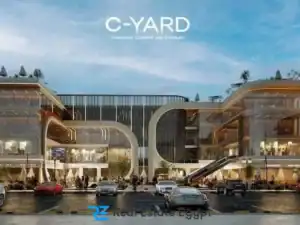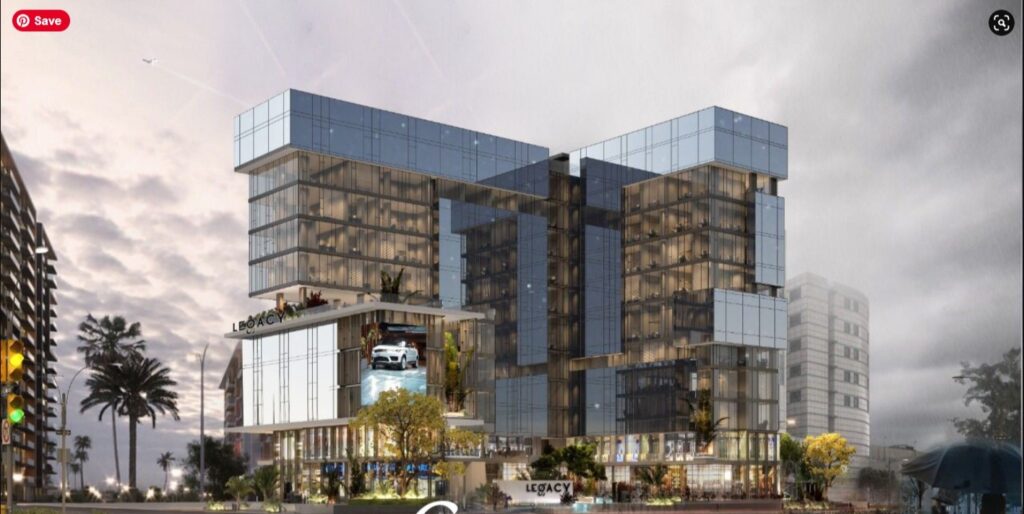Concrete development in Egypt has risen recently, with a growing need for infrastructure and housing. Concrete Development is a real estate developer with a wide range of land portfolios and properties. They are dedicated to providing real estate products of real value to customers and the Egyptian economy.
One of Concrete Development’s advantages is its commitment to delivering projects on time without any delay. They work as one team, consolidating the values of cooperation, creativity, and loyalty among staff. This approach ensures they can provide their customers with high-quality, affordable properties that meet their needs and expectations.
Egypt’s flourishing population necessitates a corresponding growth in housing and infrastructure. This developer is strategically positioned to address this demand, boasting a diverse portfolio and a track record of finishing assignments on time and under budget. Their commitment to timely delivery makes them a strong contender for those seeking a new residence or a potentially rewarding investment opportunity in the Egyptian real estate market.
Historical Context of Construction in Egypt
Egypt has a rich history, and its architecture and construction techniques have evolved to reflect its changing needs and cultural influences. The construction industry in Egypt has played a significant role in the country’s development, with engineering and construction techniques dating back to ancient times.
Evolution of Building Techniques
The construction industry in Egypt has a long history, dating back to the ancient Egyptians, who built some of the world’s most iconic structures, such as the pyramids and temples. These structures were built using stone blocks, and the techniques used to quarry, transport, and place these blocks were highly advanced for their time.
Over time, Egypt’s building techniques evolved with the introduction of new materials and technologies. For example, concrete was used extensively in construction during the Roman period, with many structures still standing today. The use of mud bricks was also everyday in ancient Egypt, and these bricks were used to build homes and other structures.
Influence of Egyptian Architecture
Egyptian architecture has significantly influenced the development of construction techniques worldwide. Columns, arches, and other architectural features can be traced back to ancient Egyptian structures, which have been incorporated into many modern buildings.
Egypt’s Islamic architecture, which is still widely used throughout the nation and is characterized by calligraphy and intricate geometric patterns, has had an impact on the building sector. Many modern buildings bear this influence.
In conclusion, the construction industry in Egypt has a rich history, with engineering and construction techniques dating back to ancient times. The evolution of building techniques and the influence of Egyptian architecture have significantly impacted the development of construction techniques worldwide.

Current Landscape of Concrete Development
Major Construction Companies
Egypt’s construction industry has been experiencing rapid growth in recent years, and Concrete Development is one of the major players in the market. They have a wide range of land portfolios and properties. Their focus is on providing high-quality construction services to their clients.
In addition to Concrete Development, other major construction companies in Egypt include Orascom Construction, Hassan Allam, and Arab Contractors. These companies are also involved in large-scale construction projects across the country.
Innovative Construction Materials
Innovation is essential to the construction industry, and Concrete Development is no exception. They are constantly exploring new and innovative construction materials to improve the quality of their projects.
Innovative materials such as self-healing, smart, and ultra-high-performance (UHPC) are gaining popularity in the industry. These materials offer superior strength, durability, and sustainability, making them ideal for large-scale construction projects.

Role of Concrete Plus and Redcon Construction
Concrete Development has two subsidiaries: Concrete Plus and Redcon Construction. Concrete Plus is one of the top providers of ready-mix concrete and cement in Egypt. It offers a wide selection of goods to meet the demands of different building projects.
Conversely, Redcon Construction is a specialty construction firm that works on major projects, including hospitals, universities, and airports. Its team of talented individuals is committed to providing top-notch building services.
To sum up, Concrete Development is one of the main participants in Egypt’s building market. They are dedicated to offering top-notch construction services and are always looking into cutting-edge new building materials. Redcon Construction and Concrete Plus, two of their subsidiaries, are essential to the business’s success.
Infrastructure and Mega Projects
In recent years, Egypt has made significant investments in the development and building of infrastructure, concentrating on creating new urban centers and enhancing the infrastructure related to utilities and transportation. The Foreign Monetary Fund (IMF) and the Agence Francaise de Developpement (AFD) are two foreign institutions that have backed these initiatives, which are intended to propel economic growth and financial stability in the nation.
New Cairo Developments
One key area of focus for infrastructure development in Egypt has been the creation of new urban centers, such as New Cairo. This development, located east of Cairo, is aimed at relieving congestion in the capital city and creating a new hub for business and administration. The project has involved the construction of new residential areas, commercial districts, and public spaces, as well as expanding transportation infrastructure.
New Administrative Capital
Situated roughly 45 kilometers east of Cairo, the New Administrative Capital is another significant urban development project in Egypt. This project aims to establish a new commercial and administrative center for the nation while emphasizing modernity and sustainability. The development will include a variety of residential, business, and public areas, along with new utilities and transportation infrastructure.
Transportation and Utility Infrastructure
In addition to creating new urban centers, Egypt has invested heavily in transportation and utilities infrastructure. One of the most notable projects in this area is the Hurghada Luxor High-Speed Rail, which spans 1700 kilometers and aims to revolutionize transportation in Egypt. Other infrastructure projects include expanding road networks, power production capacity, and rail infrastructure.
Overall, Egypt’s investments in infrastructure and mega projects are aimed at driving economic growth and improving the quality of life for its citizens. With continued investment and development, Egypt is poised to become a leader in infrastructure and urban development in the region.
Sustainable Development in Egypt
In recent years, Egypt has made notable progress toward sustainable development. The nation has put laws and procedures in place to support sustainable development because it understands how important it is to balance economic growth and social and environmental concerns.

Green Building Practices
Egypt has made major advances in various sectors, including green building approaches. The country has learned how important it is to reduce greenhouse gases during construction and maintenance operations. As a result, adopting sustainable building materials and incorporating energy-efficient technologies into buildings has grown increasingly fashionable.
Several green building certification programs have also been formed in Egypt. For example, the Egyptian Green Building Council’s Green Pyramid Rating System certifies buildings that satisfy specific sustainability requirements. These initiatives have increased the nation’s understanding of the value of green buildings and assisted in promoting sustainable building methods.
Sustainable Urban Planning
Egypt has also made efforts to promote sustainable urban planning. The country has recognized the importance of creating livable, sustainable cities that promote social and economic development while minimizing environmental impact. As a result, a number of initiatives have been aimed at improving urban infrastructure, promoting public transportation, and reducing traffic congestion.
Egypt has also passed laws to encourage the use of clean energy in cities, such as solar energy. The nation has also created a large number of parks and green spaces in metropolitan areas, which not only give locals access to recreational possibilities but also help enhance the quality of the air and lower the impact of the urban heat island effect.
Egypt has made impressive progress toward sustainable development. The nation has put laws and procedures in place to support sustainable development because it understands how important it is to balance economic growth and social and environmental concerns. By keeping sustainability at the forefront of its policies and practices, Egypt can secure a brighter future for its people and the environment.
Economic Impact of Construction Sector
The construction sector in Egypt has been increasing in recent years, with significant investment opportunities for local and international investors. The industry directly impacts the country’s economy, particularly employment and GDP.
Investment Opportunities
Egypt’s government has strongly emphasized infrastructure development and construction as key engines of urban growth and financial stability. This focus has created a favorable environment for investment in the construction sector. Major companies such as H.A.Construction (H.A.C), DORRA Group, AL-AHLY Development, Palm Hills Developments, and The Arab Contractors operate in this market.
In addition, the government has established initiatives to encourage international investors, such as tax breaks, simplified permit application procedures, and the formation of free zones. These policies have produced an atmosphere that promotes investment in the construction sector.
Impact on Employment and GDP
The construction industry contributes significantly to Egypt’s jobs and GDP. The sector employs many people, both directly and indirectly, and has a multiplier effect on other areas of the economy. According to ResearchAndMarkets.com, the Egypt Construction Market is estimated to reach USD 50.78 billion in 2024 and increase at an 8.39% CAGR to USD 75.97 billion in 2029.
Egypt’s construction sector is vital beyond simply providing buildings and infrastructure. Its activities have a multiplier effect, stimulating growth across other sectors of the economy. As construction projects progress, they demand resources and services from various industries, such as manufacturing, transportation, and finance. This increased activity translates to job creation, higher wages, and a stronger GDP.
This positive impact and the government’s focus on infrastructure development provide a good setting for local and international investors looking for opportunities in the Egyptian construction sector.
Project Management and Efficiency
Advanced Management Techniques
Concrete Development Egypt is committed to managing all its projects effectively and efficiently. The company has adopted advanced management techniques that ensure the successful execution of projects while decreasing costs and maximizing profits. The company’s management team is highly skilled and experienced in project management. They use their expertise to ensure that all projects are finished on schedule, within the set budget, and with the highest quality standards.
One of the techniques Concrete Development Egypt uses is Lean Construction. This technique involves eliminating waste in construction processes, which results in increased efficiency and productivity. The company also uses Building Information Modeling (BIM) to enhance project management.BIM is the digital representation of a construction project’s physical and functional qualities. It helps to improve collaboration, reduce errors, and increase efficiency.
Improving Construction Efficiency
Concrete Development Egypt is committed to improving construction efficiency in all its projects. To accomplish this, the organization has taken several steps. One of the measures is the use of advanced construction equipment and technology. The company uses efficient and reliable state-of-the-art equipment, which helps reduce construction time and costs.
The company also invests in the training and development of its workforce. The employees are trained on the latest construction techniques and technologies, which helps to improve their skills and expertise. This, in turn, helps to improve construction efficiency and reduce costs.
In addition, Concrete Development Egypt has a strict quality control process that ensures that all construction materials and products meet the required standards. This process reduces waste and the need for rework, which helps to improve construction efficiency.
All things considered, Concrete Development Egypt is dedicated to ensuring that every project is run successfully and economically. The company’s adoption of advanced management techniques and commitment to improving construction efficiency have enabled it to successfully complete numerous projects to the highest quality standards.
Specialized Construction Sectors
Commercial and Administrative Buildings
Egypt’s construction industry has been booming in recent years, particularly emphasizing commercial and administrative buildings. These structures are designed to provide comfortable and efficient workspaces for businesses and government agencies.
Leading construction companies in Egypt have expertise in constructing high-rise office buildings, shopping centers, and other commercial properties. They employ contemporary building methods and supplies to guarantee that these buildings are safe, durable, and energy-efficient.
Industrial and Manufacturing Facilities
Egypt has a robust industrial sector, and the construction of industrial and manufacturing facilities is vital to the country’s economic development. These facilities are designed to provide efficient and safe workspaces for factories and other industrial operations.
Egypt’s construction companies have experience constructing a wide range of manufacturing and industrial structures, including factories, warehouses, and distribution centers. They use specialized construction techniques and materials to ensure that these facilities can withstand the demands of industrial operations.
Residential and Educational Structures
Egypt’s construction industry also includes residential and educational structures. These buildings are designed to provide safe, comfortable, and efficient living and learning spaces for people of all ages.
Leading construction companies in Egypt have experience constructing various residential and educational structures, including apartment buildings, villas, schools, and universities. They employ advanced building methods and supplies to guarantee that these structures are safe, durable, and energy-efficient.
In conclusion, Egypt’s construction industry is highly specialized, with companies focusing on commercial and administrative buildings, industrial and manufacturing facilities, and residential and educational structures. These companies use modern construction techniques and materials to ensure their projects are safe, durable, and energy-efficient.
Challenges and Solutions in Egyptian Construction
Egypt’s construction industry has grown rapidly in recent years due in large part to the government’s emphasis on infrastructure development and construction as vital drivers of urban growth and financial stability. However, to guarantee sustainable growth, the industry must address several issues.
Regulatory Hurdles and Compliance
One of the significant challenges in the Egyptian construction industry is regulatory hurdles and compliance. Both domestic and foreign investors may find navigating the industry’s complicated rules and regulations challenging. Project approval delays could result from this complexity, significantly affecting project budgets and schedules.
To address this challenge, the Egyptian government has streamlined the regulatory framework and improved compliance. In 2019, the government introduced a new investment law to simplify the investment process and provide more incentives for investors. The law also established a one-stop shop for investors to obtain all necessary permits and licenses.
Quality Control and Standardization
Another challenge in the Egyptian construction industry is quality control and standardization. The industry has historically struggled with quality issues, which can lead to safety concerns and project delays. Additionally, construction practices need more standardization, making it difficult to compare and evaluate different projects.
The government has introduced several initiatives to improve quality control and standardization to address this challenge. For example, the government has established a new authority to oversee the quality of construction materials and products. The authority is responsible for testing and certifying materials and products to meet national and international standards.
Overall, while the Egyptian construction industry faces several challenges, the government’s commitment to infrastructure development and construction and its efforts to streamline regulations and improve quality control provide a solid foundation for sustainable growth in the industry.
The Future of Construction in Egypt
As Egypt’s economy continues to grow, so does its construction industry. The future of construction in Egypt is shaping up to be heavily focused on technological advancements and innovation, as well as the role of education and training for engineers.
Technological Advancements and Automation
In recent years, one of the most significant changes in the construction industry has been the development of new technologies and automation. These technologies could revolutionize the process of planning, organizing, and carrying out building projects.
For example, Building Information Modeling (BIM) is a technology that allows architects, engineers, and construction professionals to create digital models of buildings and infrastructure projects. This technology can reduce errors and improve stakeholder communication, leading to more efficient and cost-effective projects.
Another area of technological advancement is automation. Robotics and drones are increasingly used in construction projects to perform dangerous or difficult tasks for humans. This can shorten project completion times and lower costs while enhancing building site safety.
The Role of Education and Training for Engineers
The importance of education and training for engineers grows as the construction industry adopts more advanced technologies. For engineers to be able to plan and carry out projects that satisfy stakeholders and clients, they will need to be trained in the newest methods and technologies.
Engineers will need to develop soft skills like problem-solving, collaboration, and communication in addition to technical skills. These abilities are required for managing projects well and collaborating with other professionals in the construction sector.
Education and training programs must be updated to accommodate the construction sector’s evolving needs. This will require collaboration between educational institutions, industry associations, and employers to ensure that engineers are equipped with the skills they need to succeed in the future of construction in Egypt.
Overall, the future of construction in Egypt is full of promise and potential. With the right investments in technology and education, the sector is able to keep on expanding and prospering, providing jobs and economic opportunities for Egyptians for years to come.
Frequently Asked Questions
What are the latest pricing trends in Egypt’s concrete industry?
Due to several variables, including competition, inflation, and currency exchange rates, pricing trends in Egypt’s concrete industry are constantly shifting. Nevertheless, It is widely acknowledged that labor, raw material, and transportation costs impact the price of concrete production. Concrete Development, one of Egypt’s top concrete developers, provides competitive pricing that matches industry trends.
Can you list some major concrete development projects recently completed in Egypt?
There have been several major concrete development projects completed in Egypt in recent years. Some notable examples include the New Administrative Capital, the Grand Egyptian Museum, and the Cairo Metro Line 3. BIM is a digital representation of a construction project’s physical and functional qualities. Has worked on several infrastructure projects, industrial facilities, and residential and commercial buildings nationwide.
How do Concrete Development’s services compare with those of other developers in Egypt?
Concrete Development prides itself on its commitment to quality, safety, and customer satisfaction. The company uses state-of-the-art technology and equipment to ensure its projects are completed on time and to the highest standards. Concrete Development’s team of experienced professionals has an established track record of achieving successful projects across various sectors. The company’s services are highly regarded in the industry and are known for their reliability and efficiency.
Where can I find reliable reviews of concrete development companies in Egypt?
Several online platforms, including business directories, social media platforms, and industry-specific websites, offer reviews of concrete development companies in Egypt. It is important to conduct thorough research and read reviews from multiple sources to gain a comprehensive understanding of a company’s reputation and track record.
What qualifications should a reputable concrete developer have in Egypt?
A reputable concrete developer in Egypt should have a valid license from the relevant authorities, such as the Egyptian Federation for Construction and Building Contractors. The company should also have a strong portfolio of completed projects, a skilled workforce, and a commitment to quality and safety. Additionally, a reputable developer should have a good reputation in the industry and a track record of delivering successful projects.
What innovations is Concrete Plus bringing to the Egyptian concrete development sector?
Concrete Plus is a leading concrete development company in Egypt known for its innovative approach to construction. The business creates eco-friendly, sustainable infrastructure and buildings using state-of-the-art materials and technology. In addition, Concrete Plus provides clients with solutions tailored to suit their specific requirements. Among the company’s inventive endeavors are creating self-healing concrete and applying 3D printing technology in buildings.












